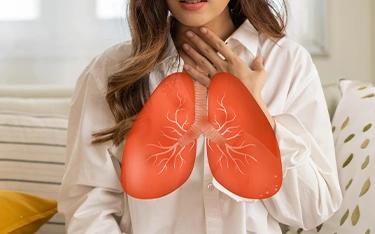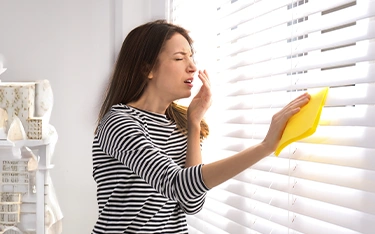As women enter their 40s and 50s, the journey through perimenopause and menopause often brings unexpected health changes. One such concern that frequently goes unnoticed is the worsening of asthma symptoms. Hormonal fluctuations, especially a drop in estrogen and progesterone, can make breathing issues more prominent. You're not alone if you've noticed increased shortness of breath, chest tightness, or wheezing during midlife.
In India, asthma affects over 34 million people, with women above 40 reporting higher respiratory distress during hormonal transitions. This blog will help you understand the connection between asthma and menopause, explore management tips, and introduce a gentle, effective solution: homeopathy.At Dr Batra’s®, personalised homeopathic treatment focuses on balancing hormones, strengthening lung function, and offering long-term relief without side effects, especially designed to support women through midlife transitions.
Menopause and Asthma: Uncovering the Hidden Link
What Triggers It?
- Hormonal fluctuations reduce airway tolerance.
- Progesterone withdrawal increases airway hyperresponsiveness.
- Stress, sleep disturbances, and reduced immunity worsen symptoms.
Role of Hormones and Immunity
The interplay between estrogen, progesterone, and lung function is complex. Estrogen helps reduce inflammation, while progesterone can act as a bronchodilator. As these hormones decline during perimenopause, women often report worsening of asthma symptoms
Women with pre-existing bronchial asthma may see frequent flare-ups or need higher medication doses during menopause.
Environmental and Lifestyle Factors
- Rising pollution levels across Indian cities impact women's midlife breathing.
- A sedentary lifestyle, poor diet, and weight gain significantly contribute to worsening asthma during menopause. Taking proactive steps to address these factors is crucial for better respiratory health..
- Mental stress and poor sleep also reduce respiratory strength.
A 2023 study by the Indian Chest Society found that air pollution worsens bronchial asthma in menopausal women by 45%
Tips to Manage Asthma During Midlife
How to Manage Asthma Naturally
- Track triggers: Use an asthma diary to identify if weather, food, or stress impact your symptoms.
- Stay active: Choose low-impact exercises like walking or yoga to improve lung capacity.
- Improve diet: Add omega-3, vitamin D, and antioxidants to reduce inflammation.
- Avoid pollutants: Wear a mask while commuting; invest in indoor air purifiers.
- Practice breathwork: Techniques like pranayama can enhance lung strength.
Dr Batra’s® pro tip:
Notice shortness of breath or wheezing during menopause? Don’t dismiss it. Track symptoms regularly and consider homeopathic support to ease breathing and balance hormones naturally.
Homeopathy for Asthma – A Natural Solution
Homeopathy offers a safe, side-effect-free solution for bronchial asthma treatment, especially in women experiencing hormonal changes.
How It Works:
- Strengthens immune response and reduces airway inflammation
- Balances hormonal changes affecting lung function
- Offers long-term relief without dependence on steroids or inhalers
Common Remedies:
- Arsenicum Album: For wheezing and anxiety-triggered asthma
- Blatta Orientalis: Effective for bronchial asthma with cough and congestion
- Ipecacuanha: For asthma with mucus build-up
Homeopathy offers a gentle and holistic way to treat asthma and menopause from the inside out.




